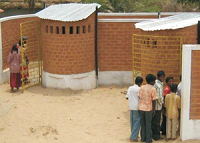/topics/sanitation
Sanitation
Conference report: The Anil Agarwal Dialogue on Excreta does matter organised by Centre for Science and Environment on 45 March 2013 at New Delhi
Posted on 22 Nov, 2014 10:30 AMA close examination of these two issues shows that the water and sewage challenge is already grave and could get worse. With this as the backdrop, Centre for Science and Environment (CSE), a public interest research and advocacy organisation based in New Delhi, organised a two day conference called the Anil Agarwal Dialogue on “Excreta does matter”. The conference took place at the Jacaranda Hall, India Habitat Centre, Lodhi Road, New Delhi on 4 and 5 March 2013.
The dialogue aimed at furthering the agenda of CSE’s seventh State of India’s Environment report titled Excreta Matters. This report is a comprehensive survey of the situation of water and wastewater management in 71 Indian cities. The study found that most cities lack a basic policy direction on how best to tackle issues of demand, supply and treatment of water, and of management of sewage.
The Dialogue being the first of its kind brought together a wide range of professionals, activists, practitioners, policy makers, academicians, researchers and administrators from the water sector. The event was aimed at drawing attention on the critical issues of how cities will get affordable and sustainable water and waste systems that can supply to all and take back and treat the sewage of all.

How have Indias flagship development programmes fared Budget briefs on the TSC JNNURM and MGNREGS by the Accountability Initiative
Posted on 22 Nov, 2014 10:30 AMGovernment of India’s development programmes are aimed to bring in much required inclusive development and pave a way towards an equitable and socially just society. With this motive the Centre had introduced several programmes in social sectors and allocated a fixed amount for achieving the set goals.
An analysis on the performance of the programmes shows how far the targets have been achieved, the shortcomings and the steps that are to be taken to strengthen the programmes.

An evaluative study on the informal water distribution system in Kaula Bandar slum in Mumbai: A paper in BioMed Central Public Health Journal
Posted on 22 Nov, 2014 10:30 AMAs a result of rapid urbanisation, majority of migrated population is forced to settle in places which are not legally recognised by state authorities. These areas thus lack in basic services like water supply and sewerage. Consequently, the slum dwellers often resort to illegal methods to avail these services.
Toilets in the making: Delhi Urban Art Commission DUAC designs eco friendly and low cost public toilets for Delhi
Posted on 22 Nov, 2014 10:30 AM

Water in India Situation and prospects: Book release by UNICEF FAO and SaciWaters
Posted on 22 Nov, 2014 10:30 AMThe report released at UNDP, New Delhi on February 14, 2013 attempts to consolidate the significant amounts of information available on water and sanitation in India and also aims to examine the key current challenges in the sector; both the threats and opportunities for the water sector in India.
Dr Aidan Cronin, Water, Sanitation and Hygiene Specialist, UNICEF gives a sneak preview to the report
Video courtesy: UNICEF
Subsidy or shame Which technique works better in improving sanitation in India Talk by Sumeet Patil NEERMAN at the 3ie seminar at Delhi February 2013
Posted on 22 Nov, 2014 10:30 AMSubsidy proponents believe that the poor need economic incentives while shaming proponents contend that to bring out lasting behavioural change, intrinsic motivation is required; people are more likely to use and value things they have had to pay for.
Strategies for achieving environmental sustainability in rural development A report by United Nations Development Programme
Posted on 22 Nov, 2014 10:30 AMThis report by the United Nations Development Programme (UNDP) presents strategies for inclusive rural development embodying the principles of environmental sustainability. It recommends measures needed to achieve green, including measuring and tracking, the use incentives and the building of capacities. It also contains a number of case studies showing how green results can be achieved.
Anthropogenic activities leads to deterioration of groundwater quality: A study of Mayyanad and Edamulakkal panchayats of Kollam district in Kerala
Posted on 22 Nov, 2014 10:30 AMKerala is a rain blessed state in the country. It has highest number of wells, when compared with other states. However due to its slanting topography there is significant decline in the ground water levels leading to severe water scarcity during summer months in most districts of the state. Further over extraction and dependence of groundwater for domestic use from the dug wells especially in rural pockets has resulted in several groundwater problems. In this backdrop the paper in The Ecosan- An International Quarterly Journal of Environmental Science, sheds light on groundwater quality issues in two panchayats of Kerala.






